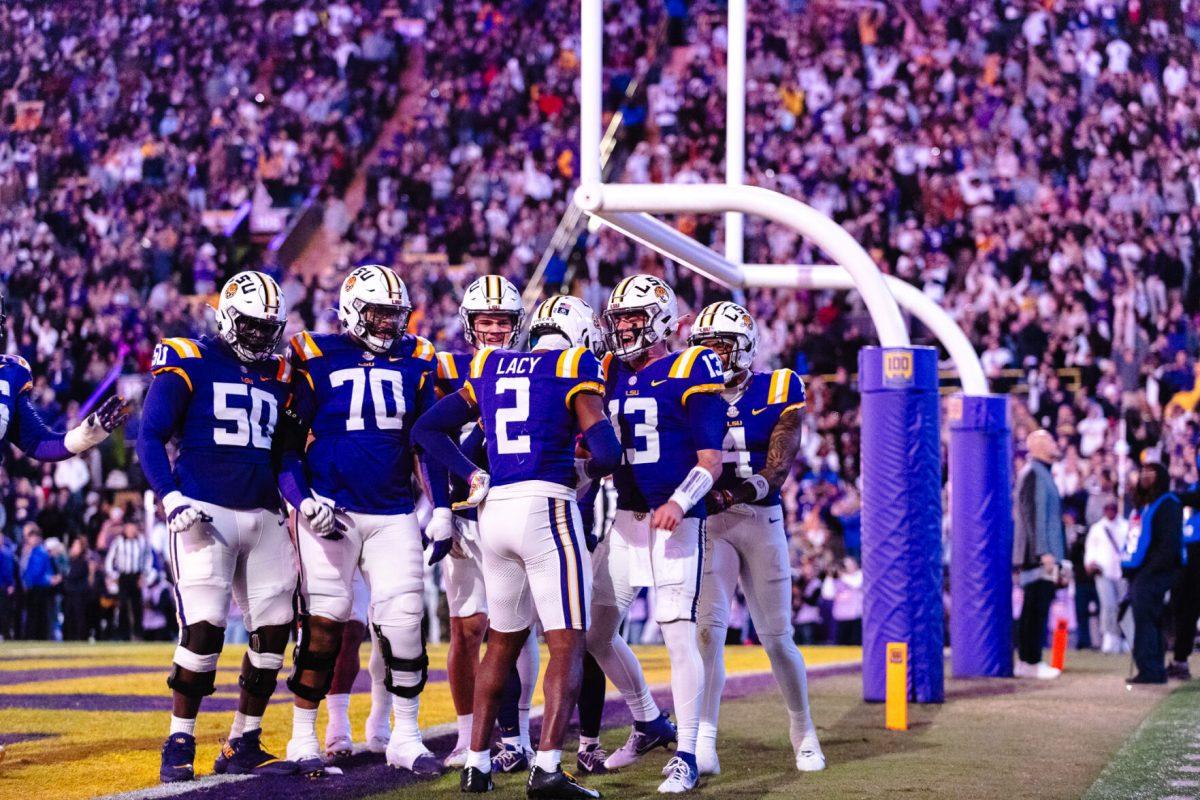There’s speed and then there’s football speed.
Someone forgot to tell LSU freshman cornerback Kavahra Holmes.
From the gridiron to the track, Holmes is used to sprinting past his opposition.
“Speed is the advantage in almost any sport,” he said last month at Football Media Day, the only time true freshmen are allowed to speak with the media. “It’s my specialty.”
The Breaux Bridge native is on scholarship with the No. 2 Tigers this fall, but his athletic season won’t end after an LSU bowl game.
He’ll hop across Nicholson Drive this spring and join the track team, where he is expected to run the 400-meter dash and several relay events.
Multi-sport athletes are nothing new for LSU coach Les Miles.
Trindon Holliday and Xavier Carter each split time between the track and the turf, former safety Chad Jones pitched on LSU’s 2009 baseball national championship team and sophomore safety Ronald Martin dabbled in basketball last season.
But there’s always the whispers.
“I’m always being asked about one sport or the other,” Holmes said.
LSU track and field coach Dennis Shaver said Holmes shouldn’t feel pressure to choose.
“He’s a genuine two-sport athlete,” Shaver said. “He’s on scholarship for football, but it was important to show how many past guys have succeeded doing both under Miles. We’re all looking for great athletes.”
The 6-foot-2 product entered fall camp as a wide receiver, mostly running deep routes and even taking a few reverses after catching 23 passes for 377 yards alongside fellow incoming LSU wideout Travin Dural at Breaux Bridge High School last fall.
But the coaching staff switched him to cornerback for depth purposes after Tyrann Mathieu’s dismissal last month, an abrupt change for a top-100 receiving recruit.
“We’re not necessarily saying [cornerback] is the place he’ll end up,” Miles said during fall camp. “…He came in and did a great job at receiver.”
While his football pads and LSU’s classic white jersey may obscure Holmes’ lanky 180-pound frame, there’s no hiding it on the track.
There’s also no hiding his speed.
Holmes was the No. 2-ranked 400-meter high-school runner in the country, setting a state record with a 46.07 time during the 2011 AAU Junior Olympics in New Orleans.
He also led Breaux Bridge to the 2011 state title, anchoring two relay teams and winning the individual 400-meter dash.
Then the Olympics came calling.
Holmes was invited to the U.S. Olympic Track and Field Trials in June, a dream opportunity for the sprinter.
He declined.
“I was in summer school for LSU,” Holmes said. “I had to focus on academics to be ready for football. The Olympics are my dream and there’s no doubt I would love to be ready for the 2016 Rio Games. That is on my list, but football was first this time.”
That left him watching the London Olympics from his West Campus apartment, wondering what could have been if he had made it.
But Holmes had his second family to remind him why he stayed.
Holmes is one of four Tigers from Breaux Bridge, a town of just 8,139 people.
Sophomore defensive lineman Quentin Thomas and freshman Lamar Louis each grew up with Holmes and are now his roommates, creating a family atmosphere an hour away from home.
“I’m pretty sure his mom could whip me and my mom could whip him — that’s just how tight we are,” Louis said. “We know he’ll eventually be running for Team USA. It’s no limit on his opportunities because we’ve seen the work from the beginning.”
Thomas said Holmes is almost as quick with a joke as he is on his feet, but still needed to learn the rigors of being an athlete at LSU.
“Such a funny guy — always playing pranks,” Thomas said. “But obviously, it’s an adjustment for anybody. I’ve been here a year, so that benefitted Lamar and him. We get to stay close.”
One of those adjustments involves Holmes’ lean frame. It’s an ideal figure for speeding down the track.
For Saturdays in the Southeastern Conference? Not exactly.
Holmes said he had to bulk up to hold his own on the football field.
“The main focus is about hitting the weight room and getting more physical,” he said. “That’s not the goal for track. It’s about lean muscle and sleek speed.”
But Shaver, who also lauded Holmes’ decision to skip the Olympic Trials as “wise,” said football training doesn’t impede a track athlete as long as he or she stays injury-free.
“What they do during the fall really does prepare them to transition sports,” he said. “We’ll bring him along slow, but he’s used to switching. Football speed and track speed are two different things, but Kavahra is blessed with both.”







